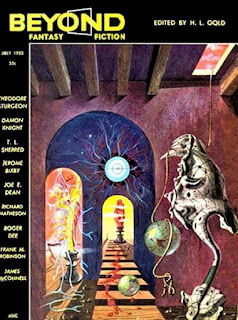Beyond Fantasy Fiction. H. L. Gold, editor. Vol. 1 No. 1, July 1953
Beyond Fantasy Fiction 1:1 at the ISFdb
Beyond Fantasy Fiction 1:1 at Goodreads
Overall 7/10
 |
| Cover by Richard Powers |
Regardless, Beyond featured some strong stories, and this first issue included nothing terrible and some good content. My personal favourite stories are "The Springbird" by Roger Dee and "Share Alike" by Jerome Bixby and Joe E. Dean. In addition, most of the art is quite good, particularly Ed Emshwiller's work on Damon Knight's "Babel II."
Too bad about all the typos that can break up some focused reading. My favourite is from "Eye of Iniquity": "...if you except the fact that my own mother was born with a caul..." [139]
...And My Fear is Great... by Theodore Sturgeon 7/10
Eighteen year-old Don meets sixty year-old Miss Phoebe, a woman with special powers who takes the misguided man under her wing. She opens his mind to eastern philosophical concepts, and gets him to think about the world around him, wishing to share her power with him in order to do good. However, she tells him he must remain celibate and alone, whereas he has recently fallen in love.
A good story with some issues, such as a point of view that jumps for convenience sake to withhold some information from the reader, and a didactic latter portion. Still interesting, with good character dynamics and overall quite original.
All of You by James McConnell 6/10
An unhappy, corpulent man has fled Earth and crash-landed on a distant planet. There he is found by an alien female who immediately falls in love with him, as obesity is valued in their culture. Yet in this matriarchal world the elder women take the man from her, claiming that all their females should have rights on him, come mating season. A nice little piece of space horror that becomes obvious at about the half-way mark, though the author does well in delaying the eventual end. An example of a non-fantastical story.
The Day the World Ended by Frank M. Robinson 6/10
TV reporter Bill Wyser interviews Professor Arnold, a scientist who has just appeared on a program pitting science against superstition. The pair argue both sides, and Arnold informs him that his university will pay anyone ten grand if they can come up with a superstition that gives a better explanation for a phenomena than does science. Short and entertaining enough, though I was underwhelmed by the ending.
The Springbird by Roger Dee 8/10
Marble County finds itself in perpetual spring, as April weather conditions continue for seven months. The country doctor narrator takes a weekly drive to Moorhead Mountain to visit Romanian gipsy Lysko Czernak who lives with his grandson, who is dying from tuberculosis. A touching story of love and what we are capable of when it comes to making someone happy. Moreover, it is well written, with soft prose that matches the slow passing of spring.
Babel II by Damon Knight 6/10
Photographer and comics artist Cavanaugh encounters an odd little man he refers to as Hooligan. They can communicate through a spherical object where they can think up images, and quickly the Hooligan wants to trade diamonds for the many objects in Cavanaugh's home. Unintentionally, the Hooligan mixes up human languages, so that chaos quickly breaks out as no one can understand one another.
An average story with some good points. Though the story is intended to be humourous, the quick regression to violence is wholly unbelievable. Also, Cavanaugh's running around New York is tedious and needless. The Hooligan and its communication device are neat, but only bookend the story. I am usually underwhelmed with Knight's novelettes, preferring his shorter pieces. Stories like "Babel II," "Double Meaning" and "Rule Golden" contain some neat ideas, but aren't developed well as longer works.
Share Alike by Jerome Bixby and Joe E. Dean 8/10
A pair of men are stranded in a lifeboat after their ship has sunk. They are not too worried as neither men knew anyone aboard who had perished, and there is much food and water in the boat's store. Moreover, they are in a well-travelled ship lane. Only, the American Craig is eating his share of the stock, whereas the Romanian Eric seems not to be eating at all, and Craig begins to suspect that his mate is a vampire. A very well written story with a strong relationship between two very different men who are forced to share--one his portion of the stores and the other his blood--in order that they both survive.
The Wedding by Richard Matheson 6/10
Before they are to be married, Frank begins to place unusual demands surrounding their wedding, such as not getting married on a Thursday and paying her father as symbol of the purchase of his daughter. A quick and amusing story with an effective comedic twist. The second story in the issue to revolve around superstitions.
Eye for Iniquity by T. L. Sheperd 6/10
McNally has the inherited talent of duplicating money. Simply by staring at a bill, a duplicate will appear beside it. He puts the talent to good use, quits his job, buys a house, and takes his family shopping. Then he learns there is concern as counterfeit money is being discovered in various shops, and soon the government begins to take interest in him.
Interesting enough of a story, but the protagonist is not very smart so it is difficult to sympathize with him. Along with some stereotypical service agents and revenue bureau officers, with the standard 1950s agreeable wife, the story fizzles in its latter stages, particularly that it is overlong.














